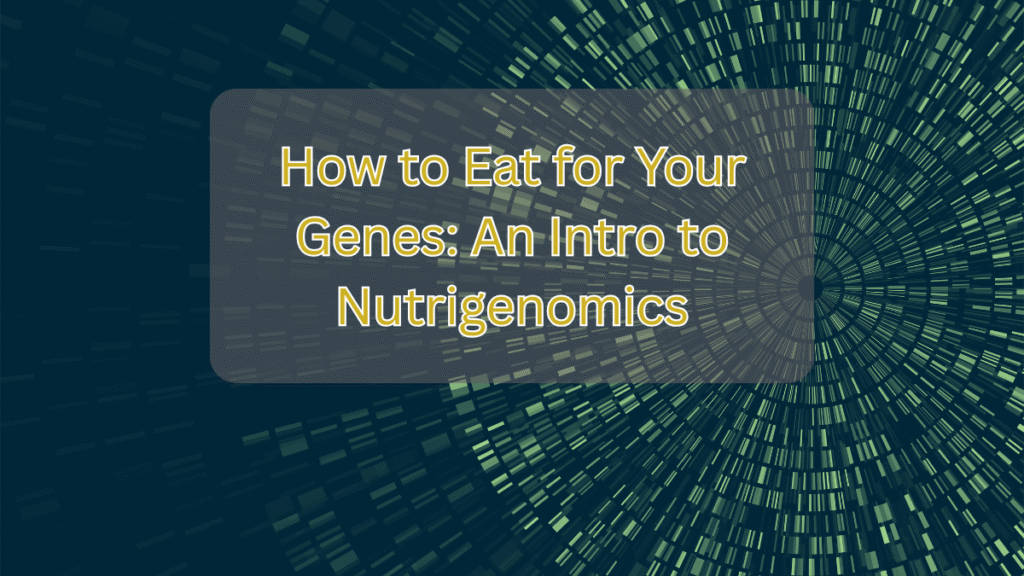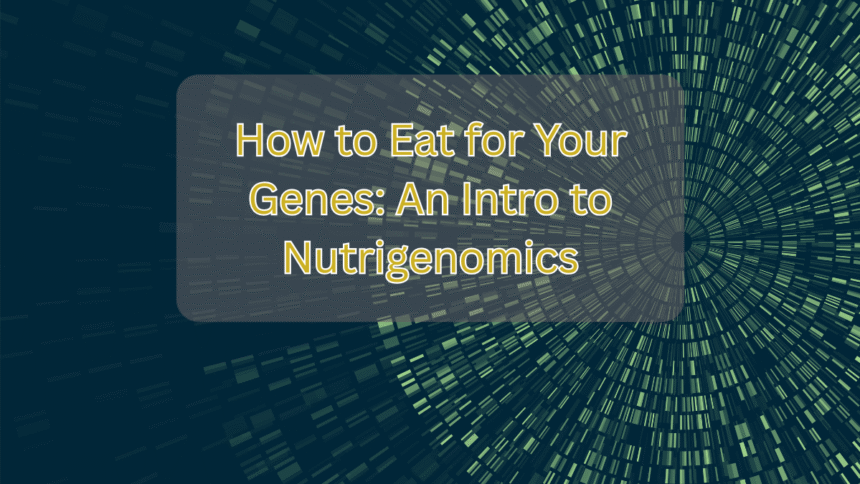Nutrigenomics
Have you ever wondered why some people thrive on a high-fat keto diet while others feel sluggish? Or why your friend can handle caffeine like a champ, but one cup leaves you jittery? The answer may lie in your genes.
Welcome to the fascinating world of nutrigenomics—the science of how food interacts with your DNA to influence health, weight, and disease risk. In this guide, we’ll break down what nutrigenomics is, how it works, and practical tips to eat for your genes so you can optimize your diet for better energy, metabolism, and longevity.

What Is Nutrigenomics?
Nutrigenomics is the study of how nutrients affect gene expression. In simpler terms, it explores how the food you eat “talks” to your DNA, turning certain genes on or off. This field combines nutrition, genetics, and biochemistry to create personalized diet plans tailored to your unique genetic makeup.
Why Does It Matter?
We’ve all heard the saying, “One man’s food is another man’s poison.” Nutrigenomics explains why:
- Some people metabolize carbs efficiently, while others store them as fat.
- Certain genes influence how well you absorb vitamins like B12 or folate.
- Food sensitivities (like lactose intolerance) are often genetically driven.
By understanding your genetic predispositions, you can make smarter food choices that align with your body’s needs.
How to Eat for Your Genes: Key Nutrigenomics Tips
1. Know Your Genetic Weaknesses (And Strengths)
Not all genes are created equal. Some variations (called SNPs—single nucleotide polymorphisms) affect how your body processes nutrients. For example:
- MTHFR Gene: Affects folate metabolism. If you have a mutation, you may need more leafy greens or methylated B vitamins.
- FTO Gene: Linked to obesity risk. Carriers may benefit from higher protein and fiber intake.
- CYP1A2 Gene: Determines caffeine metabolism. Slow metabolizers should limit coffee to avoid anxiety or sleep issues.
Action Step: Consider a DNA test (like 23andMe or AncestryDNA) and upload your raw data to nutrition-focused platforms (e.g., NutraHacker, GenoPalate) for personalized insights.
2. Optimize Macronutrients Based on Your DNA
Your genes influence how well you handle fats, carbs, and proteins:
- Carb Sensitivity: People with certain variants in the TCF7L2 gene may struggle with blood sugar control and do better on lower-carb diets.
- Fat Metabolism: The APOA2 gene affects how saturated fats impact your weight. Some people thrive on healthy fats (avocados, nuts), while others gain weight easily.
- Protein Needs: The AMPD1 gene affects muscle recovery. Athletes with certain variants may need more protein for optimal performance.
Action Step: Experiment with macronutrient ratios (e.g., low-carb vs. Mediterranean) and track how your body responds.
Video Credits
3. Identify Food Sensitivities Through Genetics
Ever felt bloated after dairy or gluten? Your genes might be to blame:
- Lactose Intolerance: The LCT gene determines whether you produce lactase (the enzyme that digests milk).
- Gluten Sensitivity: The HLA-DQ genes are linked to celiac disease and non-celiac gluten sensitivity.
- Caffeine Sensitivity: The CYP1A2 gene affects how quickly you break down caffeine.
Action Step: If you suspect a sensitivity, try an elimination diet or get tested for food intolerances.
4. Eat for Your Ancestry
Your ancestors’ diet can influence your genetic needs:
- Northern Europeans: Often better at digesting dairy due to long-term lactose tolerance.
- East Asians: More likely to have the ALDH2 gene variant, making alcohol metabolism harder (hello, “Asian flush”).
- Mediterranean Populations: Genetically adapted to high olive oil and fish consumption.
Action Step: Look into traditional diets from your heritage—they might suit your genes better than modern fad diets.
5. Use Nutrigenomics for Longevity & Disease Prevention
Certain genes influence inflammation, detoxification, and aging:
- GSTM1/GSTT1 Genes: Affect detox pathways. If you have deletions, load up on cruciferous veggies (broccoli, kale).
- ApoE Gene: Linked to Alzheimer’s risk. ApoE4 carriers may benefit from a low-sugar, high-omega-3 diet.
- Nrf2 Pathway: Controls antioxidant responses. Foods like turmeric and green tea can activate it.
Action Step: Focus on anti-inflammatory foods (berries, fatty fish, nuts) and minimize processed sugars.
Final Thoughts: Is Nutrigenomics Worth It?
While nutrigenomics is still evolving, it offers a personalized approach to nutrition that goes beyond one-size-fits-all diet advice. By understanding your genetic blueprint, you can:
✔ Eat foods that work with your body, not against it.
✔ Prevent nutrient deficiencies before they cause problems.
✔ Optimize energy, weight, and long-term health.
Next Steps:
- Get a DNA test if you’re curious about your genetic predispositions.
- Work with a nutrigenomics dietitian for a tailored plan.
- Experiment with small dietary tweaks and track how you feel.
Have you tried eating for your genes? Share your experiences in the comments! And if you found this guide helpful, don’t forget to share it with friends who might benefit.











